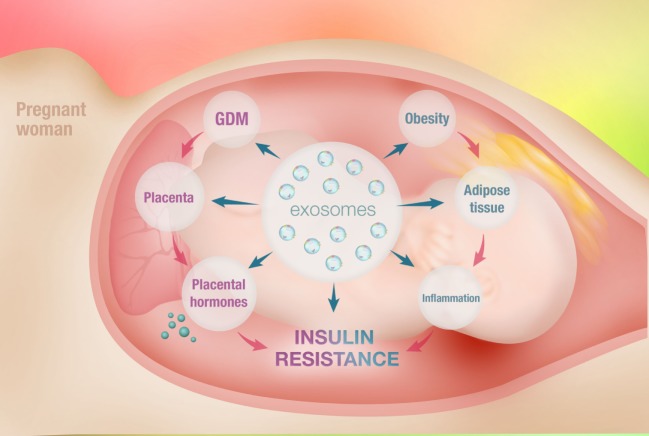Figure 1.
Schematic diagram of intercellular communication between adipose tissue and placenta mediated by adipose tissue-derived exosomes. Obesity refers to an accumulation of excessive fat in adipose tissue due to an imbalance between energy intake and expenditure. This causes hypertrophic expansion of adipocytes and abnormalities in physiological regulation. This is associated with increased free fatty acid release, activation of macrophages, and secretion of elevated amount of pro-inflammatory cytokines, causing systemic inflammation. This is known as metabolically induced inflammation. The marked increase in systemic inflammation is associated with the development of obesity-induced insulin resistance. Gestational diabetes mellitus (GDM) is glucose intolerance diagnosed for the first time during pregnancy. Placental morphological changes as well as altered placental metabolic status are observed in GDM. The placental dysfunction seen in GDM represents an adaptation of the placenta to increased maternal inflammation and results in increased secretion of inflammatory cytokines, further exacerbating inflammation. This potentially causes impairment in insulin sensitivity and development of GDM. However, the evolving concept of maternal obesity and inflammation may not be the full story in the development of GDM. This is due to insufficient data supporting a role for inflammatory cytokines as an initiator of insulin resistance in pregnancy. Interestingly, the various functions of adipose tissue are also orchestrated by the exosomes. Exosomes are mediators of intercellular communication and are capable of regulating cellular mechanisms. Exosomes from adipose tissue are known to regulate the metabolic activity of various cells via paracrine mechanisms. In obesity, adipose tissue-derived exosomes cargo profiles are dysregulated and mediate obesity-associated diseases, including insulin resistance. Thus, it is fair to speculate that the adipose tissue-derived exosomes potentially mediate the communication between adipose tissue and placenta, playing an important role in the development of GDM.

